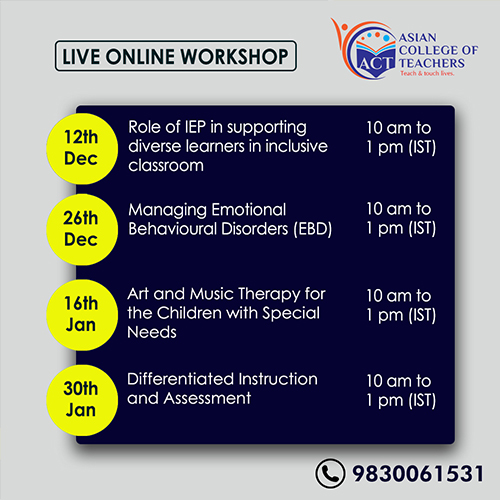Course Overview
In light of the rapid global expansion of inclusive classrooms, there is a growing demand for proficient educators with expertise in Special Educational Needs (SEN). Asian College of Teachers (ACT), UK, offers specialized training courses for Special Education teachers, equipping them with essential skills to meet industry requirements. These courses focus extensively on ADHD, Autism, and various Learning Disabilities, providing aspiring and practicing teachers with in-depth knowledge. The courses are divided into three levels: Certificate, Diploma, and P G Diploma.
Special Education
ACT's online Special Education certificate programs provide comprehensive education about disabilities such as ADHD, Autism, and other learning disabilities. The curriculum at each level establishes a strong foundation in these areas, helping educators identify disabilities in children accurately and facilitating their effective development.
Autism
ACT's online Autism teacher training courses are research-backed and cover the analysis of autism and related disabilities. These courses aid educators in better understanding their learners, supporting their development, and nurturing their unique interests. Enrolling in the Autism teacher training course enables participants to grasp topics such as the transition from Adolescence to Adulthood, life-skills training, and other crucial aspects of raising a child with autism.
ADHD
For those aiming to become Special Needs Educators specializing in ADHD, a common childhood neurodevelopmental disorder, ACT's ADHD teacher training course is an ideal choice. This course equips teachers and SEN aspirants with a profound understanding of ADHD and its symptoms, enabling them to identify learners in their classrooms who might have ADHD. Comprehensive knowledge on ADHD is available through the Diploma/PG Diploma courses, which also offer a brief overview of Down Syndrome.
Learning Disabilities
ACT's course on Learning Disabilities is designed for educators who want to teach in inclusive classrooms worldwide and help learners with special needs excel academically and in life. The certificate course in learning disability covers a range of disabilities such as Dyslexia, Dysgraphia, Dyscalculia, and Dyspraxia.
Live Online SEN Workshop
To provide fundamental knowledge in Special Educational Needs, Asian College of Teachers offers a 3-day live online SEN workshop. This workshop allows participants from around the world to attend live online special education classes, enabling interaction with facilitators and peers for enhanced learning.
Duration and Fees
| Course Name | Duration | Eligibility | Price |
|---|---|---|---|
| Certificate in Special Education (ADHD, Autism and Learning Disabilities) | 4 months | 10+2 | 18000 INR |
| Diploma in Special Education (ADHD, Autism and Learning Disabilities) | 8 months | 10+2 | 35000 INR |
| PG Diploma in Special Education (ADHD, Autism and Learning Disabilities) | 12 months | Bachelor's Degree | 37000 INR (without CACHE), 47000 INR (with CACHE) |
| SEN for Parents | 4 months | 10+2 | 13500 |
| Certificate in Learning Disabilities | 4 months | 10 + 2 | 13000 |
| Diploma in Learning Disabilities | 8 months | 10 + 2 | 18000 |
| PG Diploma in Learning Disabilities | 12 months | Bachelor's Degree | 30000 INR (without CACHE), 37000 INR (with CACHE) |
| Certificate in Autism | 4 months | 10 + 2 | 13000 |
| Diploma in Autism | 8 months | 10 + 2 | 18000 |
| PG Diploma in Autism | 12 months | Bachelor's Degree | 30000 INR (without CACHE), 37000 INR (with CACHE) |
| Certificate in ADHD | 4 months | 10 + 2 | 13000 |
| Diploma in ADHD | 8 months | 10 + 2 | 18000 |
| PG Diploma in ADHD | 12 months | Bachelor's Degree | 30000 INR (without CACHE), 37000 INR (with CACHE) |
Curriculum
ADHD
- ADHD Phase 1: Understanding students
- ADHD Phase 2 : Diagnostic Process
- ADHD Phase 3 : Are they putting in the Effort?
- ADHD Phase 4 : ADHD and Brain Activation
- ADHD Phase 5 : ADHD and Activity Level
Autism
- AUTISM Phase 1 : Meet Autistic Students
- AUTISM Phase 2 : Understand the common characteristics of HFA/AS
- AUTISM Phase 3 : Discover how your students think
- AUTISM Phase 4 : Nurture students' social skills
- AUTISM Phase 5 : Encourage language reciprocity
Learning Disabilities
- LD Phase 1 : Understanding Learning Disabilities
- LD Phase 2 : Identifying Students with LDs
- LD Phase 3 : Making sense of the IEPs
- LD Phase 4 : Understanding Service Locations
- LD Phase 5 : Learning the Right Teaching Strategies
ADHD
- ADHD Phase 1 : Understanding students
- ADHD Phase 2 : Diagnostic Process
- ADHD Phase 3 : Are they putting in the Effort?
- ADHD Phase 4 : ADHD and Brain Activation
- ADHD Phase 5 : ADHD and Activity Level
- ADHD Phase 6 : Role of Parents
- ADHD Phase 7 : Clinical Diagnosis of ADHD
- ADHD Phase 8 : Down Syndrome Autism
Down Syndrome
- Down Syndrome – Definition and History
- Identifying Down Syndrome in Children
- Causes and Complications of Down Syndrome
- Teaching Children with Down Syndrome
- Inclusive Education for Children with Down Syndrome
Autism
- AUTISM Phase 1 : Meet Autistic Students
- AUTISM Phase 2 : Understand the common characteristics of HFA/AS
- AUTISM Phase 3 : Discover how your students think
- AUTISM Phase 4 : Nurture students' social skills
- AUTISM Phase 5 : Encourage language reciprocity
- AUTISM Phase 6 :Autism and Inclusive Education
- AUTISM Phase 7 :Transition from Adolescence to Adulthood
- AUTISM Phase 8 :a Asperger's Syndrome
- AUTISM Phase 8 :b Fragile X Syndrome
- AUTISM Phase 8 :c High Functioning Autism
Learning Disabilities
- LD Phase 1 :Understanding Learning Disabilities
- LD Phase 2 :Identifying Students with LDs
- LD Phase 3 :Making sense of the IEPs
- LD Phase 4 :Understanding Service Locations
- LD Phase 5 :Learning the Right Teaching Strategies
- LD Phase 6 :Learning Strategies and Assessment Techniques for Students with Learning Disabilities
- LD Phase 7 :Dyslexia
- LD Phase 8 :Dysgraphia and Dyscalculia
ADHD
- ADHD Phase 1 :Understanding students
- ADHD Phase 2 :Diagnostic Process
- ADHD Phase 3 :Are they putting in the Effort?
- ADHD Phase 4 :ADHD and Brain Activation
- ADHD Phase 5 :ADHD and Activity Level
- ADHD Phase 6 :Role of Parents
- ADHD Phase 7 :Clinical Diagnosis of ADHD
- ADHD Phase 8 :Down Syndrome
- ADHD Phase 9 :Role of Teacher and Parents for Supporting Children with ADHD
Down Syndrome
- Down Syndrome – Definition and History
- Identifying Down Syndrome in Children
- Causes and Complications of Down Syndrome
- Teaching Children with Down Syndrome
- Inclusive Education for Children with Down Syndrome
Autism
- AUTISM Phase 1 :Meet Autistic Students
- AUTISM Phase 2 :Understand the common characteristics of HFA/AS
- AUTISM Phase 3 :Discover how your students think
- AUTISM Phase 4 :Nurture students' social skills
- AUTISM Phase 5 :Encourage language reciprocity
- AUTISM Phase 6 :Autism and Inclusive Education
- AUTISM Phase 7 :Transition from Adolescence to Adulthood
- AUTISM Phase 8 a :Asperger's Syndrome
- AUTISM Phase 8 b :Fragile X Syndrome
- AUTISM Phase 8 c :High Functioning Autism
- AUTISM Phase 9 :Types of Play Skills for Autistic Learners
Learning Disabilities
- LD Phase 1 :Understanding Learning Disabilities
- LD Phase 2 :Identifying Students with LDs
- LD Phase 3 :Making sense of the IEPs
- LD Phase 4 :Understanding Service Locations
- LD Phase 5 :Learning the Right Teaching Strategies
- LD Phase 6 : Learning Strategies and Assessment Techniques for Students with Learning Disabilities
- LD Phase 7 :Dyslexia
- LD Phase 8 :Dysgraphia and Dyscalculia
- LD Phase 9 : Language Processing Disorder
Certificate in Autism
- Phase 1: Meet your Students with Autism
- Phase 2: Understand the Common Characteristics of HFA/AS
- Phase 3: Discover How Your Students Think
- Phase 4: Nurture Students & Social Skills
- Phase 5: Encourage Language Reciprocity
- Phase 6: Work with Sensory Sensitivities
- Phase 7: Nurture Special Interests
- Phase 8: Encourage Homework Completion
Diploma in Autism
- Phase 1: Meet your Students with Autism
- Phase 2: Understand the Common Characteristics of HFA/AS
- Phase 3: Discover How Your Students Think
- Phase 4: Nurture Students & Social Skills
- Phase 5: Encourage Language Reciprocity
- Phase 6: Work with Sensory Sensitivities
- Phase 7: Nurture Special Interests
- Phase 8: Encourage Homework Completion
- Phase 9: Counter Runaway Emotions and Meltdowns
- Phase 10: Redirect Violent Fixations
- Phase 11: Foster Attentiveness
- Phase 12: Plan for the Future
- Phase 13:
- Asperger Syndrome (AS)
- High Functioning Autism (HFA)
- Fragile X Syndrome (FXS)
- Phase 14:
- Landau-Kleffner Syndrome (LKS)
- Prader-Willi Syndrome (PWS)
- Rett Syndrome (RS)
- Phase 15:
- Tardive Dyskinesia (TD)
- Williams Syndrome (WS)
- Pathological Demand Avoidance (PDA)
- Phase 16: Autism and Inclusive Education
- Phase 17: Transition from Adolescence to Adulthood
Post Graduate Diploma in Autism
- Phase 1: Meet your Students with Autism
- Phase 2: Understand the Common Characteristics of HFA/AS
- Phase 3: Discover How Your Students Think
- Phase 4: Nurture Students & Social Skills
- Phase 5: Encourage Language Reciprocity
- Phase 6: Work with Sensory Sensitivities
- Phase 7: Nurture Special Interests
- Phase 8: Encourage Homework Completion
- Phase 9: Counter Runaway Emotions and Meltdowns
- Phase 10: Redirect Violent Fixations
- Phase 11: Foster Attentiveness
- Phase 12: Plan for the Future
- Phase 13:
- Asperger Syndrome (AS)
- High Functioning Autism (HFA)
- Fragile X Syndrome (FXS)
- Phase 14:
- Landau-Kleffner Syndrome (LKS)
- Prader-Willi Syndrome (PWS)
- Rett Syndrome (RS)
- Phase 15:
- Tardive Dyskinesia (TD)
- Williams Syndrome (WS)
- Pathological Demand Avoidance (PDA)
- Phase 16: Autism and Inclusive Education
- Phase 17: Transition from Adolescence to Adulthood
- Phase 18: Autism Spectrum Disorder affects Play
- Phase 19: Types of Play Skill for Autistic Learners
- Phase 20: Life Skills Training
- Phase 21: Reading, Literacy and Comprehension for children with autism
- Phase 22: Understanding Sensory Processing Issues
Certificate in ADHD
- Phase 1: Understanding Students with ADHD
- Phase 2: The Diagnostic Process
- Phase 3: Are They Putting in the Effort?
- Phase 4: ADHD and Brain Activation
- Phase 5: ADHD and Activity Level
- Phase 6: Attention and ADHD
- Phase 7: The Emotional Impact of ADHD
- Phase 8: Memory
Diploma in ADHD
- Phase 1: Understanding Students with ADHD
- Phase 2: The Diagnostic Process
- Phase 3: Are They Putting in the Effort?
- Phase 4: ADHD and Brain Activation
- Phase 5: ADHD and Activity Level
- Phase 6: Attention and ADHD
- Phase 7: The Emotional Impact of ADHD
- Phase 8: Memory
- Phase 9: Problem-Solving for Academic Performance
- Phase 10: Classroom Beliefs and Rules
- Phase 11: Preplanning and Facilitating an ADHD-Friendly Classroom
- Phase 12: Student Self-Reliance
- Phase 13: Previous Understanding about ADHD was a myth
- Phase 14: Role of Family
- Phase 15: Clinical Diagnosis of ADHD
Down Syndrome
- Definition and History
- Identifying Down Syndrome in Children
- Causes and Complications of Down Syndrome
- Teaching Children with Down Syndrome
- Inclusive Education for Children with Down Syndrome
PG Diploma in ADHD
- Phase 1: Understanding Students with ADHD
- Phase 2: The Diagnostic Process
- Phase 3: Are They Putting in the Effort?
- Phase 4: ADHD and Brain Activation
- Phase 5: ADHD and Activity Level
- Phase 6: Attention and ADHD
- Phase 7: The Emotional Impact of ADHD
- Phase 8: Memory
- Phase 9: Problem-Solving for Academic Performance
- Phase 10: Classroom Beliefs and Rules
- Phase 11: Preplanning and Facilitating an ADHD-Friendly Classroom
- Phase 12: Student Self-Reliance
- Phase 13: Previous Understanding about ADHD was a myth
- Phase 14: Role of Family
- Phase 15: Clinical Diagnosis of ADHD
- Phase 16: Role of Teacher and Parents
- Phase 17: Deafness
- Phase 18: Orthopaedic Impairment
- Phase 19: Intellectual Disabilities
- Phase 20: Multiple Disabilities
(Additional course: CACHE endorsed online course – Recognising and Supporting Children with Special Needs).
Certificate in Learning Disabilities
ACT also offers Live Online SEN Seminars regarding various related topics to prepare potential or working professionals from the teaching/SEN backgrounds to develop newer outlook, upgrade their skills and expand their insights into the various aspects of teaching special children.
- Phase 1: Understanding Learning Disabilities
- Phase 2: Identifying Students with LDs
- Phase 3: Making Sense of the IEP
- Phase 4: Understanding Service Locations
- Phase 5: Learning the Right Teaching Strategies
- Phase 6: Helping Students with Word Identification Problems
- Phase 7: Helping Students with Reading Comprehension Problems
- Phase 8: Helping Students with Written Expression Problems
Diploma in Learning Disabilities
- Phase 1: Understanding Learning Disabilities
- Phase 2: Identifying Students with LDs
- Phase 3: Making Sense of the IEP
- Phase 4: Understanding Service Locations
- Phase 5: Learning the Right Teaching Strategies
- Phase 6: Helping Students with Word Identification Problems
- Phase 7: Helping Students with Reading Comprehension Problems
- Phase 8: Helping Students with Written Expression Problems
- Phase 9: Helping Students with Math Reasoning and Calculation Problems
- Phase 10: Modifying Your Classroom
- Phase 11: Managing Student Behaviour
- Phase 12: Linking Home and School
- Phase 13: Instructional Methods to help students with LD overcome challenges in an Inclusive Classroom
- Phase 14: Learning Strategies & Assessment Techniques for students with LD
- Phase 15: Visual and Auditory Processing Disorder
- Spatial Relation
- Visual Agnosia
- Visual Closure
- Visual Discrimination
- Phase 16: Non-Verbal Disability
- Phase 17: Specific Learning Disabilities:
- Dyslexia
- Phonemic Awareness
- Phonics
- Fluency
- Vocabulary
- Text Comprehension
- Phase 18:
- Dysgraphia
- Dyscalculia
P G Diploma in Learning Disabilities
- Phase 1: Understanding Learning Disabilities
- Phase 2: Identifying Students with LDs
- Phase 3: Making Sense of the IEP
- Phase 4: Understanding Service Locations
- Phase 5: Learning the Right Teaching Strategies
- Phase 6: Helping Students with Word Identification Problems
- Phase 7: Helping Students with Reading Comprehension Problems
- Phase 8: Helping Students with Written Expression Problems
- Phase 9: Helping Students with Math Reasoning and Calculation Problems
- Phase 10: Modifying Your Classroom
- Phase 11: Managing Student Behaviour
- Phase 12: Linking Home and School
- Phase 13: Instructional Methods to help students with LD overcome challenges in an Inclusive Classroom
- Phase 14: Learning Strategies & Assessment Techniques for students with LD
- Phase 15: Visual and Auditory Processing Disorder
- Spatial Relation
- Visual Agnosia
- Visual Closure
- Visual Discrimination
- Dyslexia
- Phonemic Awareness
- Phonics
- Fluency
- Vocabulary
- Text Comprehension
- Dysgraphia
- Dyscalculia
- Social and Emotional Development of Students with LD
- Social Skill Training
- Decision Making and Problem-Solving Skill
(Additional course: CACHE endorsed online course – Recognising and Supporting Children with Special Needs).
SEN-Live Online Workshop
| Differentiated Instruction and Assessment | 21st June 2025 | 3 pm to 6pm (IST) | Saturday |
| Art and Music Therapy for SEN students | 28th June 2025 | 3 pm to 6pm (IST) | Saturday |
| Empowering Students with Learning Disabilities | Coming soon | 3 pm to 6pm (IST) | Saturday |
| Managing ADHD in an Inclusive Classroom | Coming soon | 3 pm to 6pm (IST) | Saturday |
| Supporting Children with Autism Spectrum Disorder (ASD) in an Inclusive Classroom | Coming soon | 3 pm to 6pm (IST) | Saturday |
| Managing EBD (Emotional Behavioural Disorders) | Coming soon | 3 pm to 6pm (IST) | Saturday |
| Role of IEP with Supporting Diverse Learners in Inclusive Classroom | Coming soon | 3 pm to 6pm (IST) | Saturday |
ACT Admission and Support
- Candidates receive internationally recognized certificates from ACT, UK.
- ACT's admission process is user-friendly.
- Various online payment methods are available, including debit/credit cards, cash deposits, checks, or DDs in ACT's bank account.
- The Admission Department communicates via mail or phone.
- Special Education courses in Kerala are always accompanied by experienced and accomplished tutors
- Candidates can learn at their own pace for online courses
- All course queries/doubts will be cleared with adequate tutor support
Career Opportunities
Upon completing ACT's online special education teacher training courses, educators can pursue various roles, such as:
- Class teacher in inclusive classrooms.
- Assistant teacher in inclusive classrooms.
- Shadow teacher.
- School advisor/counselor.
- Special Education curriculum developer.
- Entrepreneur.
- Parent of a child with special needs.
The field of SEN offers numerous opportunities for trained teachers, with prospects continuing
to grow. Completing any of the offered levels will provide knowledge and expertise to stay
ahead. Successfully finishing a professional certificate course in Special Education opens doors
to exciting career opportunities. Due to increased awareness of Special Educational Needs, the
demand for qualified and certified special needs teachers remains strong and promising.
Passionate aspirants completing these special education courses can expect employment in
positions that involve working with SEN learners having autism, ADHD, LD, etc., anywhere
globally. The internationally recognized qualifications and certificates are beneficial for those
aiming to establish day care facilities, crèches, or seeking opportunities in educating children
with special needs worldwide.
ACT's Special Education courses are recognized by NASET and endorsed by various
organizations, providing an extra edge for career opportunities.
Certification & Accreditation:
- The candidates will receive a globally recognized certificate from Asian College of Teachers.
- All ACT courses are accredited by International Association for Quality Assurance in Higher Education (QAHE)
- The prestigious EQAC - Education Quality Accreditation Commission has accredited Asian College of Teachers (ACT) that has met all the standards set by this Commission.
- ACT SEN courses are certified by CPD Certification Service, UK
- Most of our Special Education courses are endorsed and accredited by CACHE which is a part of the famous UK based NCFE
- Accreditation Service for International Schools, Colleges and Universities (ASIC) a member of British Quality Foundation, has accredited Asian College of Teachers (ACT)
- Asian College of Teachers is a member of The National Association of Special Education Teachers (NASET)
- All ACT courses are endorsed by NCC Education, an awarding organisation and a global provider of British education
SEN Courses Disclaimer
All SEN Courses are developed by Asian College of Teachers Ltd, UK, and approved by CPD, UK, and endorsed by NCC Education, UK, and Short Courses from CACHE, UK through Laser Learning UK. These extensive training courses equip teachers with skills for inclusive classrooms. The courses aim to identify learning difficulties/disabilities and understand diverse pupils' characteristics. These courses do not grant SEN practitioner status or clinical practice licenses. The program is certified and endorsed by CPD (UK), NCC (UK), and some portions by CACHE (UK). These courses are not approved, endorsed, or recognized by other governmental/non- governmental agencies/bodies.







